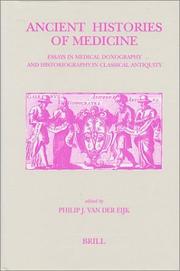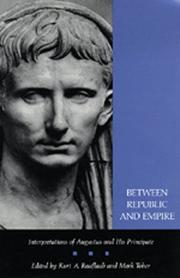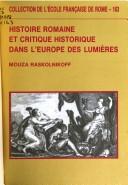| Listing 1 - 10 of 10 |
Sort by
|
Book

Year: 2022 Publisher: Berlin ; Boston : De Gruyter,
Abstract | Keywords | Export | Availability | Bookmark
 Loading...
Loading...Choose an application
- Reference Manager
- EndNote
- RefWorks (Direct export to RefWorks)
Although the relationship of Greco-Roman historians with their readerships has attracted much scholarly attention, classicists principally focus on individual historians, while there has been no collective work on the matter. The editors of this volume aspire to fill this gap and gather papers which offer an overall view of the Greco-Roman readership and of its interaction with ancient historians. The authors of this book endeavor to define the physiognomy of the audience of history in the Roman Era both by exploring the narrative arrangement of ancient historical prose and by using sources in which Greco-Roman intellectuals address the issue of the readership of history. Ancient historians shaped their accounts taking into consideration their readers' tastes, and this is evident on many different levels, such as the way a historian fashions his authorial image, addresses his readers, or uses certain compositional strategies to elicit the readers' affective and cognitive responses to his messages. The papers of this volume analyze these narrative aspects and contextualize them within their socio-political environment in order to reveal the ways ancient readerships interacted with and affected Greco-Roman historical prose.
Book

Year: 2022 Publisher: Berlin ; Boston : De Gruyter,
Abstract | Keywords | Export | Availability | Bookmark
 Loading...
Loading...Choose an application
- Reference Manager
- EndNote
- RefWorks (Direct export to RefWorks)
Although the relationship of Greco-Roman historians with their readerships has attracted much scholarly attention, classicists principally focus on individual historians, while there has been no collective work on the matter. The editors of this volume aspire to fill this gap and gather papers which offer an overall view of the Greco-Roman readership and of its interaction with ancient historians. The authors of this book endeavor to define the physiognomy of the audience of history in the Roman Era both by exploring the narrative arrangement of ancient historical prose and by using sources in which Greco-Roman intellectuals address the issue of the readership of history. Ancient historians shaped their accounts taking into consideration their readers' tastes, and this is evident on many different levels, such as the way a historian fashions his authorial image, addresses his readers, or uses certain compositional strategies to elicit the readers' affective and cognitive responses to his messages. The papers of this volume analyze these narrative aspects and contextualize them within their socio-political environment in order to reveal the ways ancient readerships interacted with and affected Greco-Roman historical prose.
Book
ISBN: 9783111320908 3111320901 Year: 2024 Publisher: Berlin ; Boston : De Gruyter,
Abstract | Keywords | Export | Availability | Bookmark
 Loading...
Loading...Choose an application
- Reference Manager
- EndNote
- RefWorks (Direct export to RefWorks)
Although digressive discourse constitutes a key feature of Greco-Roman historiography, we possess no collective volume on the matter. The chapters of this book fill this gap by offering an overall view of the use of digressions in Greco-Roman historical prose from its beginning in the 5th century BCE up to the Imperial Era. Ancient historiographers traditionally took as digressions the cases in which they interrupted their focused chronological narration. Such cases include lengthy geographical descriptions, prolepses or analepses, and authorial comments. Ancient historiographers rarely deign to interrupt their narration's main storyline with excursuses which are flagrantly disconnected from it. Instead, they often "coat" their digressions with distinctive patterns of their own thinking, thus rendering them ideological and thematic milestones within an entire work. Furthermore, digressions may constitute pivotal points in the very structure of ancient historical narratives, while ancient historians also use excursuses to establish a dialogue with their readers and to activate them in various ways. All these aspects of digressions in Greco-Roman historiography are studied in detail in the chapters of this volume.
Greco-Roman historiography. --- classical literature. --- digressions. --- narrative analysis.
Book

Year: 2022 Publisher: Berlin ; Boston : De Gruyter,
Abstract | Keywords | Export | Availability | Bookmark
 Loading...
Loading...Choose an application
- Reference Manager
- EndNote
- RefWorks (Direct export to RefWorks)
Although the relationship of Greco-Roman historians with their readerships has attracted much scholarly attention, classicists principally focus on individual historians, while there has been no collective work on the matter. The editors of this volume aspire to fill this gap and gather papers which offer an overall view of the Greco-Roman readership and of its interaction with ancient historians. The authors of this book endeavor to define the physiognomy of the audience of history in the Roman Era both by exploring the narrative arrangement of ancient historical prose and by using sources in which Greco-Roman intellectuals address the issue of the readership of history. Ancient historians shaped their accounts taking into consideration their readers' tastes, and this is evident on many different levels, such as the way a historian fashions his authorial image, addresses his readers, or uses certain compositional strategies to elicit the readers' affective and cognitive responses to his messages. The papers of this volume analyze these narrative aspects and contextualize them within their socio-political environment in order to reveal the ways ancient readerships interacted with and affected Greco-Roman historical prose.

ISBN: 9004105557 9004377476 9789004105553 9789004377479 Year: 1999 Volume: 20 Publisher: Leiden : E.J. Brill,
Abstract | Keywords | Export | Availability | Bookmark
 Loading...
Loading...Choose an application
- Reference Manager
- EndNote
- RefWorks (Direct export to RefWorks)
This collection of essays focuses on the ways in which Greek and Latin authors viewed and wrote about the history of medicine in the ancient world. Special attention is given to medical doxography, id est the description of the characteristic doctrines of the great medical authorities of the past. The volume examines the various attitudes to the history of medicine adopted by a wide range of ancient writers (e.g. Aristotle, Galen, Celsus, Herophilus, Soranus, Oribasius, Caelius Aurelianus). It discusses the historical sense of ancient medicine, the variety of versions of the medical past that were created and the wide range of purposes and strategies which medico-historical writing served. It also deals with the question of the sources, the role of historiographical traditions and the variety of literary genres of ancient medico-historical writing.
Medicine, Greek and Roman --- Authors, Greek. --- Authors, Latin. --- Historiography. --- Authors, Roman --- Latin authors --- Roman authors --- Greek authors --- Greek medicine --- Medicine, Roman --- Medicine, Unani --- Roman medicine --- Tibb (Medicine) --- Unani medicine --- Unani-Tibb (Medicine) --- Medicine, Ancient --- Medicine, Greek and Roman - Historiography.
Book
ISBN: 9783515124515 3515124519 9783515124522 3515124527 Year: 2019 Publisher: Stuttgart : Franz Steiner Verlag.
Abstract | Keywords | Export | Availability | Bookmark
 Loading...
Loading...Choose an application
- Reference Manager
- EndNote
- RefWorks (Direct export to RefWorks)
La 4e de couverture indique : "By the end of the regal period (late 6th c. BC) Rome was by far the greatest non-greek city in Italy. How she attained her enormous size was a problem for the ancients no less than for the moderns. The former agreed on Rome's birth (the firth city of the 8th c. BC on the Palatine's 15 hectares) and completion (all the traditional Seven Hills, ca. 400 hectares) ; evrerything in-between was a matter of dispute. The latter, while agreeing on the point of arrival, evidenced by the archaic remains of the "Servian Wall", reject the point of departure and so the whole literary tradition on Rome's growth, pointing out that the Palatine was inhabited much earlier and the Capitol earlier still ; another argument is a hypothetical huge (200-300 hectares) "proto-urban centre" on Rome's site. The aim of this study is to to assess the worth of the ancients' certainty that the Palatine was the city's cradle and see if their writings preserved dependable information on her growth ; the results - Rome was in fact founded on the Palatine and had one stage of growth between the "Romulean" birth and the "Servian-Tarquinian" achievement - pass well the test of confrontation with the archeological material."
Croissance urbaine --- Influence (Literary, artistic, etc.) --- Artistic impact --- Artistic influence --- Impact (Literary, artistic, etc.) --- Literary impact --- Literary influence --- Literary tradition --- Tradition (Literature) --- Art --- Influence (Psychology) --- Literature --- Intermediality --- Intertextuality --- Originality in literature --- Rome --- History --- E-books --- Wachstum --- Quelle --- Geschichte 753 v. Chr.-510 v. Chr. --- Rom --- (Produktform)Electronic book text --- Ancient History --- Archaic Rome --- Historical Topography of Rome --- Origins of Rome --- Roman antiquarianism --- Roman historiography --- (VLB-WN)9553 --- Akten --- Augenzeugenbericht --- Texte --- Historische Quelle --- Geschichtsquelle --- Quellensammlung --- Quellen --- Quellenforschung
Book
ISBN: 9789042929111 9042929111 Year: 2013 Volume: 4 Publisher: Leuven : Peeters,
Abstract | Keywords | Export | Availability | Bookmark
 Loading...
Loading...Choose an application
- Reference Manager
- EndNote
- RefWorks (Direct export to RefWorks)
This collection of essays brings innovative perspectives to the study of ancient mythography, that is, the writings of Greeks and Romans about their own mythical traditions. It treats a range of sources from the beginnings of myth criticism in the 5th century BCE to the end of antiquity in the 5th century CE, highlighting mythography's centrality to ancient views of myth and moving beyond seeing mythographic texts as valuable primarily for the preservation of details about traditional stories. Important individual mythographers are treated (e.g., Ps.-Apollodorus and Hyginus), but throughout there is an emphasis on the connections of mythography with more literary genres, such as epic, and more prestigious prose genres, such as historiography and geography. This makes the volume of interest for those who work on myth in Greek and Roman society, but also for anyone working on ancient intellectual history more broadly, including those who study rhetoric, education, literary composition, art and ancient scholarly traditions.
Greek mythology in literature --- Griekse mythologie in de literatuur --- Mythologie [Griekse ] in de literatuur --- Mythologie [Romeinse ] in literatuur --- Mythologie grecque dans la littérature --- Mythologie romaine dans la littérature --- Mythology [Greek ] in literature --- Mythology [Roman ] in literature --- Mythology, Classical --- Mythologie ancienne --- Antiquité --- --Mythe --- --Mythologie antique --- --Mythology, Greek --- Mythology, Roman --- Mythology, Greek, in literature --- Mythology, Roman, in literature --- Historiography --- Mythology, Greek --- Classical literature --- History and criticism --- Congresses --- Mythe --- Mythologie antique --- Mythology, Greek - Historiography - Congresses --- Mythology, Roman - Historiography - Congresses --- Mythology, Greek, in literature - Congresses --- Mythology, Roman, in literature - Congresses
Multi
ISBN: 9781107149861 9781316576519 9781316604397 110714986X 1316710793 1316710599 1316710548 1316576515 131660439X 1316710645 1316710696 131671084X 1316710246 9781316710692 9781316710845 9781316710791 9781316710647 9781316710548 9781316710593 Year: 2017 Publisher: New York, N.Y. Cambridge University Press
Abstract | Keywords | Export | Availability | Bookmark
 Loading...
Loading...Choose an application
- Reference Manager
- EndNote
- RefWorks (Direct export to RefWorks)
Why were seventeenth-century antiquarians so spectacularly wrong? Even if they knew what ancient monuments looked like, they deliberately distorted the representation of them in print. Deciphering the printed reconstructions of Giacomo Lauro and Athanasius Kircher, this pioneering study uncovers an antiquity born with print culture itself and from the need to accommodate competitive publishers, ambitious patrons and powerful popes. By analysing the elements of fantasy in Lauro and Kircher's archaeological visions, new levels of meaning appear. Instead of being testimonies of failed archaeology, they emerge as complex architectural messages responding to moral, political, and religious issues of the day. This book combines several histories - print, archaeology, and architecture - in the attempt to identify early modern strategies of recovering lost Rome. Many books have been written on antiquity in the Renaissance, but this book defines an antiquity that is particularly Baroque.
Monuments --- Architecture, Roman --- Antiquarians --- Printing --- Historiography --- Civilization, Baroque --- Historiography. --- History --- Social aspects --- Political aspects --- Lauro, Giacomo, --- Kircher, Athanasius, --- Criticism and interpretation. --- Rome --- Europe --- Antiquities --- Intellectual life --- History of civilization --- History of Europe --- Iconography --- anno 1600-1699 --- Antiquity --- Criticism and interpretation --- Baroque civilization --- Historical criticism --- Authorship --- Printing, Practical --- Typography --- Graphic arts --- Antiquaries --- Historians --- Roman architecture --- Historical monuments --- Architecture --- Sculpture --- Historic sites --- Memorials --- Public sculpture --- Statues --- Criticism --- Kircherus, Athanasius, --- Kircher, Atanasio, --- Chircher, Atanasio, --- Kirchere, Athanase, --- Kirker, Athanase, --- Lauri, Giacomo, --- Rim --- Roman Empire --- Roman Republic (510-30 B.C.) --- Romi (Empire) --- Byzantine Empire --- Rome (Italy) --- Monuments - Rome - Historiography --- Architecture, Roman - Historiography --- Antiquarians - Europe - History - 17th century --- Printing - Social aspects - Europe - History - 17th century --- Historiography - Political aspects - Europe - History - 17th century --- Civilization, Baroque - Europe --- Lauro, Giacomo, - active 17th century - Criticism and interpretation --- Kircher, Athanasius, - 1602-1680 - Criticism and interpretation --- Rome - Antiquities - Historiography --- Europe - Intellectual life - 17th century --- Lauro, Giacomo, - active 17th century --- Kircher, Athanasius, - 1602-1680

ISBN: 0520914511 0585193460 9780520914513 9780585193465 0520084470 0520066766 9780520066762 9780520084476 Year: 1990 Publisher: Berkeley University of California Press
Abstract | Keywords | Export | Availability | Bookmark
 Loading...
Loading...Choose an application
- Reference Manager
- EndNote
- RefWorks (Direct export to RefWorks)
Representing five major areas of Augustan scholarship--historiography, poetry, art, religion, and politics--the nineteen contributors to this volume bring us closer to a balanced, up-to-date account of Augustus and his principate.
Emperors --- Augustus, --- Octavius Caesar, --- Gaius Octavius, --- Octavius, Gaius, --- Octavianus, --- Octavianus, Gaius Julius Caesar, --- Gaius Julius Caesar Octavianus, --- Octavian, --- Caius Julius Caesar Octavianus, --- T︠S︡ezarʹ Oktavian Avgust, --- Oktavian-Avgust, T︠S︡ezarʹ, --- Avgust, T︠S︡ezarʹ Oktavian, --- Octavianus Augustus, --- Augusto, --- Cesarz August, --- Ogusṭus, --- Augustus Caesar, --- Gaius Octavius Thurinus, --- Octavio Augusto, --- Cayo Octavio Turino, --- Thurinus, Gaius Octavius, --- Turino, Cayo Octavio, --- אוגוסטוס --- Rome --- History --- Emperors - Rome - Biography --- Historiography. --- Historical criticism --- Authorship --- Criticism --- Historiography --- age of socrates. --- ancient history. --- ancient roman history. --- athenian politics. --- augustan age. --- augustan monarchy. --- augustan scholarship. --- classical history. --- classics studies. --- classics. --- european history. --- greco roman studies. --- imperial rome. --- italian history. --- julius caesar. --- pax romana. --- roman art. --- roman emperors. --- roman empire. --- roman historiography. --- roman military. --- roman poetry. --- roman politics. --- roman principate. --- roman religion. --- roman republic. --- roman revolution. --- roman social history. --- roman studies. --- saint augustus. --- tiberius. --- world history.

ISBN: 2728302537 9782728302536 Year: 1992 Volume: 159
Abstract | Keywords | Export | Availability | Bookmark
 Loading...
Loading...Choose an application
- Reference Manager
- EndNote
- RefWorks (Direct export to RefWorks)
Social institutions --- Institutions sociales --- Congresses --- Congrès --- Rome --- History --- Politics and government --- Social conditions --- Histoire --- Politique et gouvernement --- Conditions sociales --- Historiography --- Historiographie --- Enlightenment. --- Historians --- Histoire romaine --- --Historiographie --- --XVIIIe s., --- Europe --- --Chastagnol, Andre --- -Knowledge --- -Congresses --- -Sources --- -Congresses. --- Enlightenment --- -Historical criticism --- Authorship --- Aufklärung --- Eighteenth century --- Philosophy, Modern --- Rationalism --- -Authorship --- Criticism --- Beaufort, Louis de --- -Chastagnol, Andre --- -Levesque de Pouilly, Louis-Jean --- -De Beaufort, Louis --- Beaufort, L. de --- Contributions in Roman historiography --- Knowledge --- France --- Intellectual life --- -History --- -Historiography. --- Chastagnol, Andre --- -Beaufort, Louis de --- -Contributions in Roman historiography --- --Enlightenment --- Lumières (Philosophie) --- Lumières [Siècle des ] --- Siècle des Lumières --- Verlichting (Filosofie) --- -Aufklärung --- Historical criticism --- Rim --- Roman Empire --- Roman Republic (510-30 B.C.) --- Romi (Empire) --- Pʻŭrangsŭ --- Frankrig --- Francja --- Frant︠s︡ii︠a︡ --- Prantsusmaa --- Francia (Republic) --- Tsarfat --- Tsorfat --- Franḳraykh --- Frankreich --- Fa-kuo --- Faguo --- Франция --- French Republic --- République française --- Peurancih --- Frankryk --- Franse Republiek --- Francland --- Frencisc Cynewīse --- فرنسا --- Faransā --- Franza --- Republica Franzesa --- Gallia (Republic) --- Hyãsia --- Phransiya --- Fransa --- Fransa Respublikası --- Franse --- Францыя --- Frantsyi︠a︡ --- Французская Рэспубліка --- Frantsuzskai︠a︡ Rėspublika --- Parancis --- Pransya --- Franis --- Francuska --- Republika Francuska --- Bro-C'hall --- Френска република --- Frenska republika --- França --- República Francesa --- Pransiya --- Republikang Pranses --- Γαλλία --- Gallia --- Γαλλική Δημοκρατία --- Gallikē Dēmokratia --- فرانسه --- Farānsah --- צרפת --- רפובליקה הצרפתית --- Republiḳah ha-Tsarfatit --- פראנקרייך --- 法国 --- 法蘭西共和國 --- Falanxi Gongheguo --- フランス --- Furansu --- フランス共和国 --- Furansu Kyōwakoku --- Francija --- Ranska --- Frankrike --- Byzantine Empire --- Rome (Italy) --- France (Provisional government, 1944-1946) --- --Social institutions --- Congrès --- Empire, 284-476 --- 프랑스 --- Falanxi --- Fa-lan-hsi --- 法蘭西 --- Frankrijk --- Frant︠s︡ --- Франц --- Frant︠s︡ Uls --- Франц Улс --- Historiography - Europe - History - 18th century. --- Historians - Europe - History - 18th century. --- XVIIIe s., 1701-1800
| Listing 1 - 10 of 10 |
Sort by
|

 Search
Search Feedback
Feedback About UniCat
About UniCat  Help
Help News
News